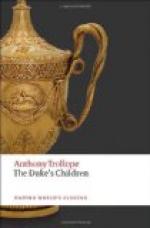Frank Tregear had come up to town at the end of February. He remained in London, with an understanding that he was not to see Lady Mary again till the Easter holidays. He was then to pay a visit to Matching, and to enter it, it may be presumed, on the full fruition of his advantages as accepted suitor. All this had been arranged with a good deal of precision,—as though there had still been a hope left that Lady Mary might change her mind. Of course there was no such hope. When the Duke asked the young man to dine with him, when he invited him to drink that memorable glass of wine, when the young man was allowed, in the presence of the Boncassens, to sit next to Lady Mary, it was of course settled. But the father probably found some relief in yielding by slow degrees. ’I would rather that there should be no correspondence till then,’ he said both to Tregear and to his daughter. And they had promised there should be no correspondence. At Easter they would meet. After Easter Mary was to come up to London to be present at her brother’s wedding, to which also Tregear had been formally invited; and it was hoped that then something might be settled as to their own marriage. Tregear, with the surgeon’s permission, took his seat in Parliament. He was introduced by two leading Members on the conservative side, but immediately afterwards found himself seated next to his friend Silverbridge on the top bench behind the ministers. The House was very full, as there was a feverish report abroad that Sir Timothy Beeswax intended to make a statement. No one quite knew what the statement was to be; but every politician in the House and out of it thought that he knew that the statement would be a bid for higher power on the part of Sir Timothy himself. If there had been dissensions in the Cabinet, the secret of them had been well kept. To Tregear who was not as yet familiar with the House there was no special appearance of activity; but Silverbridge could see that there was more than wonted animation. That the Treasury bench should be full at this time was a thing of custom. A whole broadside of questions would be fired off, one after another, like a rattle of musketry down the ranks, when as nearly as possible the report of each gun is made to follow close upon that of the gun before,—with this exception, that in such case each little sound is intended to be as like as possible to the preceding, whereas with the rattle of the questions and answers, each question and each answer becomes a little more authoritative and less courteous than the last. The Treasury bench was ready for its usual responsive firing, as the questioners were of course in their places. The opposition front bench was also crowded, and those behind were nearly equally full. There were many Peers in the gallery, and a general feeling of sensation prevailed. All this Silverbridge had been long enough in the House to appreciate;—but to Tregear the House was simply the House.




